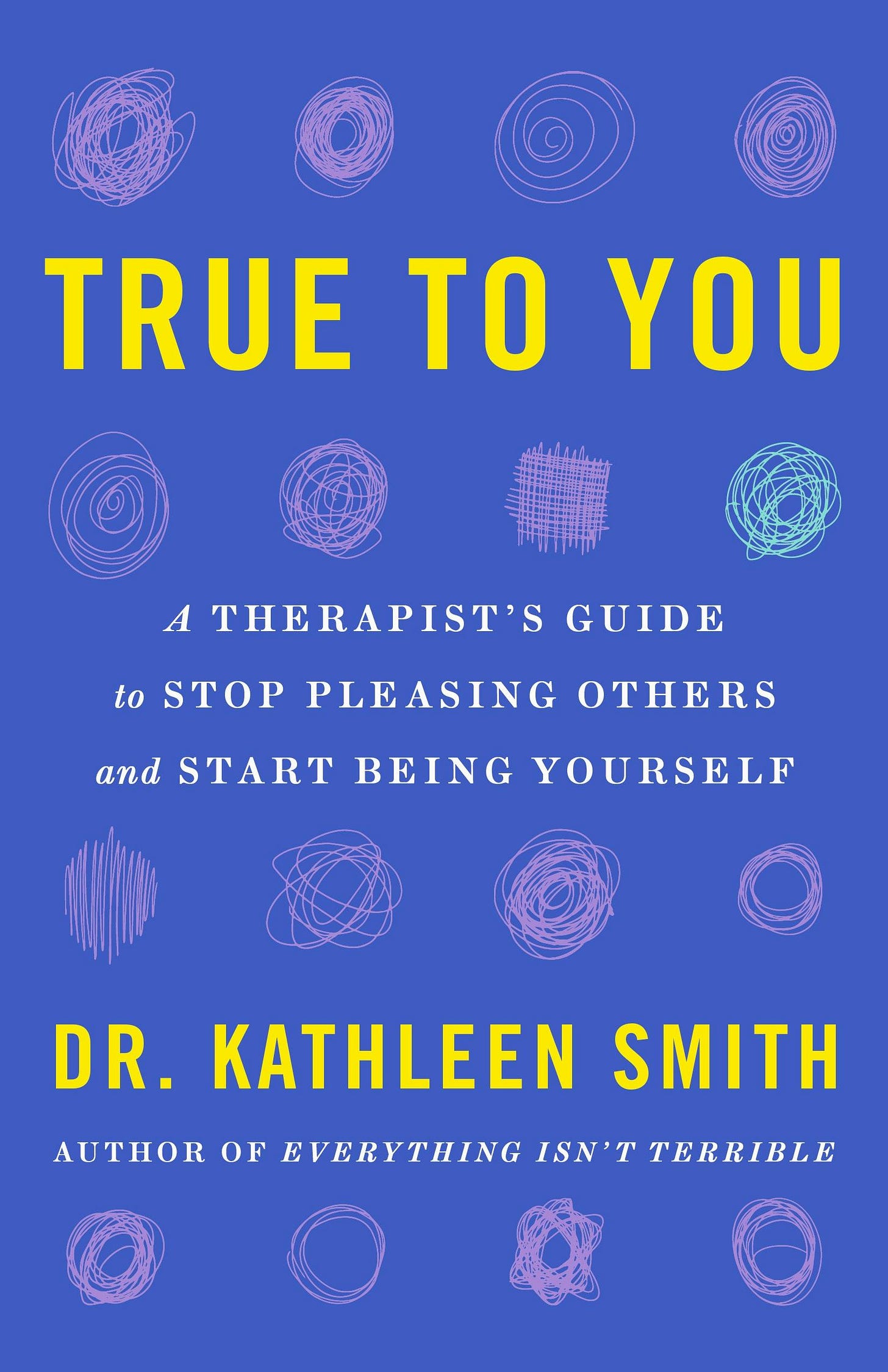How To Stop Pleasing Others — and Start Pleasing Yourself
A Q&A with therapist Dr. Kathleen Smith.
Happy September, everyone! (Also, OMG, how is it September.)
We just got back from our trip to DC, Williamsburg, Virginia and Ocean City, Maryland. We had some delicious meals in DC (my kids actually ate Ethiopian food!?) and I got to see and stay with a dear old friend. We also had fun at the beach — my kids got very into boogie-boarding — and at Colonial Williamsburg. But by far my kids’ favorite day was when we went to Busch Gardens, because of course it was. For me, not so much; I’m not a huge roller coaster fan so I spent most of that day sitting on a hard bench annotating my book for fact checkers, wheee.
But honestly? I’m happy to be back home and very ready for school to be starting (TODAY!!!!!).
I’m also thrilled today to be running an interview with therapist Dr. Kathleen Smith, the author of the fantastic new book True to You: A Therapist's Guide to Stop Pleasing Others and Start Being Yourself. Kathleen also writes the wonderful Substack
. I was very excited to talk to Kathleen about the ways in which we lose ourself to accommodate others, the role that anxiety plays in this process, and what we can do to reconnect to our selves, our needs, and our desires. But be sure to check out her entire book, which is chock full of helpful examples and excellent advice.Kathleen, what inspired you to write True to You?
We live in anxious times, and I think there’s this fascinating correlation between the amount of anxiety floating around and how quickly we borrow thinking from others to feel steady. This is true in a family, and it’s true in society. I wanted to write a book that helped people think not about what their beliefs and choices are, but how they end up adopting them. If we’re honest with ourselves, most of our moves are about getting things calm as quickly as possible, often at great cost. This is true in parenting, in work, and in any system where there’s tension.
Being human is this great challenge of walking the line between togetherness and individuality. How does a person get a little more “self” in how they operate? This is the question that fascinates me as a therapist. How do people begin to ask themselves, “What do I think?” before they grab a self-help book or turn on a podcast to fill in the blanks.
I think that many people — women, especially, because of how we are socialized — spend their whole lives catering to others' needs and wants without paying much attention to their own. And then when they do finally recognize that they're unhappy or want something different, they don't even know how to identify what it is that they do actually want. It's like they've quashed that information down for so long, they don't know how to bring it back up and tune back in. In these situations, what do you suggest people do to identify their wants and needs?
There are always people in a family or any group who are prime candidates to get overinvolved with others. This is true in humans and in other animal species. Women, oldest children, or people who function like the oldest, are particularly vulnerable to falling into this role. To get your own needs met, it’s useful to examine those ways we overfunction for others in our relationships. Because that’s where the energy gets lost. When are you doing something for someone that they can do for themselves? Can you learn to tolerate the distress that comes with not taking over? Then people can begin to ask, “What do I want to make happen? What’s interesting or meaningful to me?”
The funny thing is that doing something for self often does not manage anxiety as quickly as overfunctioning for others does. So I warn people that if they’re operating a little more for self, and letting others be responsible for themselves, the anxiety may go up for a while. I think we have this vision that moving towards yourself is instantly calming, when the opposite is often true.
What role does anxiety play in this tendency to lose one's self and focus too much on pleasing others?
Anxiety is certainly the driving force. And by anxiety I mean simply the tension generated by being a human who has to interact with other humans. Giving up a little individuality to keep things calm is tremendously adaptive for a social species like us. Society would collapse if we didn’t have this capability to go along to get along. So I think that adaptive-focus is where you start, seeing it as a product of evolution, not a dysfunction or a label you get after you take a personality test.
But a person also has to ask themselves, “What percentage of my actions are oriented towards being what others want me to be. Or getting others to react the way I want them to react?” There’s not a lot of freedom when the focus is always on the other. Our relationships tend to be less genuine, and it’s harder to be interested in people the more we want to please them. This waters down our relationships and leaves us exhausted. A move that initially feels selfish can add great flavor to our relationships, even those we’d dismissed as uninteresting or overwhelming.
Even if you recognize that you're too conciliatory or too much of a people-pleaser, and you know you want to change, it can be so hard to break out of deeply ingrained habits. Can you provide a few suggestions for what people can do to help themselves break out of old patterns and make different choices?
I love to send my therapy clients out on a 24-hour scavenger hunt to see how they accommodate to please others or chase after their attention. Simply observing, not trying to do anything different at first, takes some of the judgment away. What are the small ways you adjust yourself based on who’s in the room? Suddenly you have a hundred opportunities to test out being a more solid version of yourself. Maybe you let your kid fumble a little with a task. Maybe you leave that exclamation mark in that email because damn it you’re excited and you don’t care if it weirds people out!
Working on self-evaluation is also key. How quickly are you turning to a colleague or your partner to ask how they think you’re doing with a project or your parenting? How much energy are you putting into seeking out the other’s thinking? Now compare that with how much energy you put into developing your own thinking about how you’re doing and what kind of person you want to be. It can be sobering.
When people can spend a solid ten minutes even once a week evaluating their own functioning, trying to not be overly positive or negative, they get better at it. Cognitively, it doesn’t taste as sweet as a compliment from your boss or reassurance from a friend. But stretching that muscle can keep you from automatically involving others in how you manage your own distress or uncertainty. Suddenly, all this energy we put into getting others to respond in a positive way is freed up to make shit happen.
What should you do if your wants and needs feel totally antithetical to your current life — or seem unrealistic and impossible? Like .... maybe you realize what you really want is to travel the world, yet you have three small kids and a lot of credit card debt. What should you do in these moments when it feels like there's no hope?
Focusing on a want is one way to manage the anxiety of the moment. I’m not saying this is a good or a bad thing. In my work with folks, I focus more on people’s functioning than on how they meet a particular goal. So if they’re daydreaming about traveling around the world, I might ask them, “How do you want to function in a way that gives yourself, and others, more freedom?” Sure, a summer in Europe might give you that. But so could overfunctioning less for your kids or partner. So could being honest about your beliefs with your mother. And maybe that’s the starting point for making some of these bigger dreams happen.
I think connection, novelty, and meaning boost our functioning and give us hope, and they are attainable for most people in the course of a week. When people are overwhelmed, they often aren’t experiencing meaningful connection with others or the novelty that gets the front part of their brain cooking. So that can also be a place to start.
Is there anything else you'd like to emphasize or mention?
I can’t overemphasize how much seeing human behavior as adaptive has helped me not be so hard on myself, especially as a parent. It’s also helped me shift out of blaming others and move towards getting curious about patterns. I love helping people get curious through my newsletter and my therapy work. Most of the time, most of our moves are about getting comfortable, about keeping things chugging along. You can’t really fault people for that. But when people can get a little bit outside of what’s automatic for them, when they can be inside relationships but outside of the predictable patterns, then they’re playing ball. A new way of relating to people starts to open up, and it’s so rewarding to see.
Quick plug: My dear friend and clinical psychologist
has just developed a small group program for parents who want support in raising self-sufficient kids. Her Parent Smarter, Not Harder course not only goes deep into challenging the definition of "good parent," it is all about making real change in the family, and the group fosters a supportive, nonjudgmental community! She literally wrote the book on autonomy-supportive parenting and developed this program to help parents nurture autonomy in their children. Learn more here!






I love the 24 hour scavenger hunt idea! I’ve been talking about people pleasing a lot lately bc we already see these behaviors in my oldest and my niece but my youngest child doesn’t seem to have it at all. And ultimately I think it is better but it’s a different experience with my 5 yo starting kindergarten and not being overly worried about impressing a teacher.
"Can you learn to tolerate the distress that comes with not taking over?"
Such an essential question.